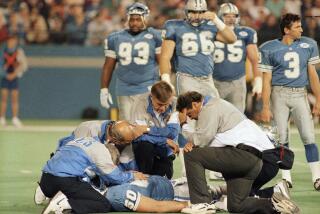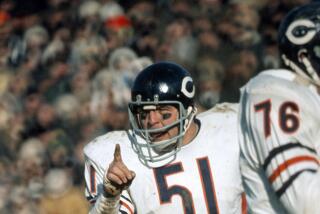This Pick Didn’t Click : Injuries, Attitude Kept Walt Patulski From Living Up to No. 1 Status
- Share via
There was no anger in the voice, only resignation.
“That’s right, it’s draft time, isn’t it?” the voice said. “Time to drag Walt Patulski out of the closet and beat him up again.”
Walt Patulski understands that from certain pains, there can be no escape.
He will never be able to leave his bed in the morning without first spending 10 minutes stretching his back.
He will never be able to lift his right arm above his head.
He will never be able to run.
And he will never be able to forget that in 1972, as a defensive end from Notre Dame, he was selected by the Buffalo Bills as the No. 1 draft pick in the country.
Surely you remember him: the worst No. 1 pick in the last 25 years.
Active only for parts of five seasons. Racked by injuries and doubt. The softest 6-foot-6, 268-pound player in the game.
“Just went through the motions,” recalled Lou Saban, his coach with the Bills.
Since retiring at 28, Patulski has done much with his life. But he cannot push aside those five seasons.
“I struggle with that failure even today,” Patulski said. “I always will.”
He is back in the news because Sunday, Rick Mirer, a quarterback, could become the first Notre Dame player since Patulski to be selected first overall when the NFL holds its 58th annual draft.
But Patulski will not be watching.
“I won’t do that to myself,” he said.
He rarely watches football on television. He says he has attended only one game since playing his last down in 1977.
He won’t even accept annual invitations from Bills’ owner Ralph Wilson to join former teammates in an old-timers’ celebration.
“I don’t want to go for the same reason I don’t like watching football on television,” Patulski said. “It hurts too much.”
But Patulski is happy to give Sunday’s top pick some advice:
Don’t screw up.
“People expect for you to be nothing less than a superstar,” he said. “There will be a tremendous amount of pressure on you. . . . People will want you to be an instant success.”
Patulski was rarely a success and, compared to other top picks, his career ended prematurely.
After four mediocre seasons at Buffalo, he was traded to the St. Louis Cardinals. He sat out one season because of a knee injury, played in 1977, then spent three days with the Chicago Bears in 1978 before undergoing career-ending back surgery.
In the five years before 1972, the top picks were Bubba Smith, Ron Yary, O.J. Simpson, Terry Bradshaw and Jim Plunkett.
In the five years after Patulski, the top picks were John Matuszak, Ed (Too Tall) Jones, Steve Bartkowski, Lee Roy Selmon and Ricky Bell.
Even Bell, who was considered something of a disappointment, played six seasons and rushed for 1,263 yards for Tampa Bay in 1979.
Today, Patulski is 43, the sales manager of a large bank in Syracuse. He spent two years on the city’s Board of Education, and still has political aspirations that could take him far from a football field.
“What happened to me in football gave me the motivation to prove to everybody that I didn’t need this game,” he said. “I retired and it was like, ‘OK, now I’ll show you.’ ”
Yet his memories, and his pain, always bring him back.
“I will go to my grave feeling that I didn’t do all I could,” Patulski said.
Although Patulski didn’t leave much of a mark on the game, it certainly left a mark on him.
“I had the excitement of being No. 1, and they can never take that away from me . . . but I am also the other side of the coin,” Patulski said. “I am proof that there is a big price to be paid.”
He can’t easily get out of bed because of his bad back. That’s also why he can’t run, or play more than nine holes of golf at a time.
He can’t lift his arm because of shoulder problems. He has bone spurs in other parts of his body, and he has resigned himself to never feeling totally sound again.
“Doctors pretty much say that it’s getting worse,” he said.
And to think that the rap on Patulski was that he was not aggressive enough.
The Bills, who had gone 1-13 the previous season, giving up at least 28 points in seven games, jumped at a chance to acquire what they thought was a defensive force in the spring of 1972.
As a senior at Notre Dame, Patulski had won the Lombardi Trophy as the nation’s best lineman and was voted most valuable player of the Hula Bowl all-star game.
But the Bills knew they were in trouble even before Patulski showed up at his first training camp.
He was late because he would not give up his position as a representative at the New York State Democratic Convention.
And Larry Felser, who covered the Bills then for the Buffalo News, remembers thinking that the Bills might have made a mistake when, on a bus headed for a game, Patulski talked about real estate, and interior decorating, and everything but football.
Observers say it was obvious that Patulski simply wasn’t mean enough.
“In tough situations, he would take the easy way out,” Saban said. “To be aggressive, it just wasn’t him.”
Saban once seethed when he read a newspaper story in which Patulski was giving a discourse on NFL labor relations.
“If only he had this much passion for football,” Saban said at the time.
During Patulski’s fourth season at Buffalo, shortly before he was traded, Patulski held a meeting with Saban and confessed the obvious.
“He told me he could not do this the rest of his life . . . he told me he was too passive,” Saban said. “There are certain things that make a pro football player, and he said he just didn’t think he had those things.”
Today Patulski says he still doesn’t have those things.
“I was a great guy . . . I am a great guy,” he said softly. “I was always the guy who you would want to go out with your daughter. I don’t think I had the proper mentality for the game.”
But that doesn’t stop him from wondering what would have happened if he had.
“I’ve saved the Sporting News cover, the one that has me as the first draft pick,” Patulski said, pausing. “But sure, I’ll get over this. Maybe in another 20 years.”
More to Read
Go beyond the scoreboard
Get the latest on L.A.'s teams in the daily Sports Report newsletter.
You may occasionally receive promotional content from the Los Angeles Times.









